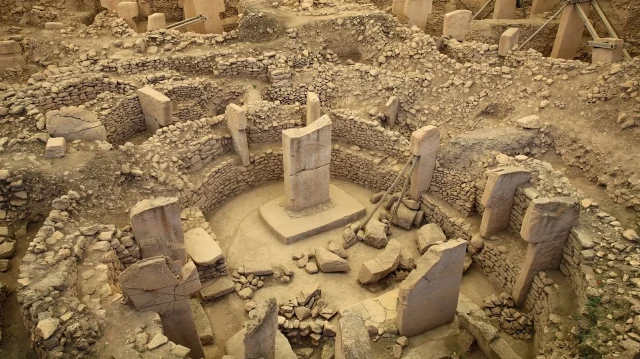
Majority of the structures are residential, with a small number of public structures
More than 50 structures from the Neolithic period have been uncovered in excavations in southeastern Türkiye being carried out within the scope of the Turkish Culture and Tourism Ministry's Stone Hills Project.
The Sayburc excavations in Sanliurfa, which began in 2021 under the leadership of archaeologist Eylem Ozdogan of Istanbul University, are continuing with the aim of revealing a settlement that reflects the Gobeklitepe culture.
The excavations have unearthed structures with T-shaped standing stones, including hearths, platforms, benches and workshop areas.
More than 50 structures have been identified so far, the majority of which are residential, with a small number of public structures.
"In Sayburc, we observed both public structures and residential buildings side by side. This provides detailed information about both daily life and the activities that took place in special buildings. The traces of daily life in the residences indicate that domestic activities related to nutrition were carried out within the houses. In the special buildings, however, the number and arrangement of T-shaped standing stones and benches are different," Ozdogan told Anadolu.
She said that excavations are still underway in both residential and special structures.
"Usually, residential buildings are found around one or two special structures. So far, five special buildings have been uncovered. The others are likely residences. T-shaped standing stones appear in both residential and public buildings. In residences, typically one stone is found, while in special buildings, there are stones arranged along the walls, with one or two stones placed in the center," she added.
Ozdogan underlined that Sayburc is an important settlement documenting the transitional processes of the Neolithic period.
"Intense settlement began in the region around 12,600 years ago during the Neolithic period. Numerous settlements were established, some for long periods and others temporarily. Among these, Karahantepe and Gobeklitepe are the most significant. Many settlements reflect different phases of the period. Sayburc is a site that was continuously occupied for nearly 300 years.
“Here, we can trace the transition from round-planned structures to rectangular ones. This provides crucial data for understanding the transformations in construction techniques and technology," she said.







